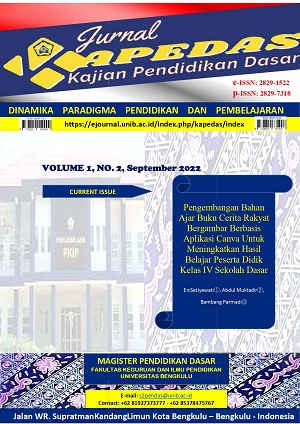Main Article Content
Abstract
Keywords
Article Details
Copyright (c) 2022 Mira Nopitria

This work is licensed under a Creative Commons Attribution-ShareAlike 4.0 International License.

Karya ini dilisensikan di bawah Creative Commons Attribution-ShareAlike 4.0 International License .
References
- Antohe, V. (2009). Limits of Educational Soft “Geogebra” in a Critical Constructive Review. Annals. Computer Science Series, 47-54.
- Arbain, N., & Shukor, N. A. (2015). The Effects of Geogebra on Students Achievement. Procedia - Social and Behavioral Sciences, 172(2007), 208–214. https://doi.org/10.1016/j.sbspro.2015.01.356
- Atiaturrahmaniah, Ibrahim, D. S. M., & Kudsiah, M. (2017). Pengembangan Pendidikan Matematika SD
- Bulut, M., Akçak?n, H. Ü., Kaya, G., & Akçak?n, V. (2016). The effects of Geogebra on third grade primary students’ academic achievement in fractions. Mathematics Education, 11(2), 327–335. https://doi.org/10.12973/iser.2016.2109a
- Delima, M. (2020). Pengembangan Lembar Kegiatan Peserta Didik Berbasis Discovery Learning Dalam Meningkatkan Hasil Belajar Peserta Didik Kelas IV Di Sekolah Dasar.
- Depdiknas. (2006). Permendiknas Nomor 22 Tahun 2006. Global Shadows: Africa in the Neoliberal World Order, 44(2), 8–10.
- Depdiknas. (2008). Panduan Pengembangan Bahan Pelajaran. Depdiknas: Jakarta.
- Fitriyadi, H. (2013). Integrasi Teknologi Informasi Komunikasi dalam Pendidikan : Potensi Manfaat, Masyarakat Berbasis Pengetahuan, Pendidikan Nilai, Strategi Implementasi dan Pengembangan Profesional. Pendidikan Teknologi Kejuruan, 21(3), 269–284.
- Hohenwarter, M., & Fuchs, K. (2005). Combination of dynamic geometry , algebra and calculus in the software system Geogebra. Computer Algebra Systems and Dynamic Geometry Systems in Mathematics Teaching Conference 2004, 2002(July), 1–6. http://www.Geogebratube.org/material/show/id/747
- Karso. (2019). Pembelajaran Matematika di SD. Pendidikan Matematika I, 1–66.
- Kemendikbud. (2016). Permendikbud Nomor 22 Tahun 2016. 42(1), 1–10.
- Kemendikbud. (2013). Kerangka Dasar dan Struktur Kurikulum 2013. Jakarta: Kemendikbud.
- ________Mathematics performance (PISA). (2020). Retrieved from OECD: https://data.oecd.org/pisa/mathematics-performance-pisa.htm
- Prastowo, A. (2015). Panduan Kreatif Membuat Bahan Ajar Inovatif. Yokyakarta: DIVA Press.
- Rahmi, S. A. (2019). Pengembangan Lembar Kerja Peserta Didik Berbasis Karakter. Jurnal Pendidikan Dan …. https://jurnal-lp2m.umnaw.ac.id/index.php/JPPT/article/view/346
- Roestiyah. (1998). Strategi Belajar Mengajar. Jakarta: Rineka Cipta.
- Sugiyono. (2019). Metode Penelitian dan Pengembangan Research and Depelopment. Bandung: Alfabeta.
- Susanta, A. (2012). Professional Learning for Teaching Mathematics through Problem Solving in Indonesian Primary Schools. September.
- Umbaryati. (2018). Pentingnya LKPD pada Pendekatan Scientific Pembelajaran Matematika. Universitas Lampung, 217–225.
- Wicaksono, d. (2015). Teori Pembelajaran Bahasa (Suatu Catatan singkat). Yogyakarta: Garudhawaca.
- Widoyoko, S. Eko Putro. (2012). Teknik Penyusunan Instrumen Penelitian. Yogyakarta: Pustaka Belajar.
- Winarni, E. W. (2018). Teori dan Praktik Penelitian Kuantitatif, Kualitatif, PTK dan R&D . Jakarta: Bumi Aksara.
References
Antohe, V. (2009). Limits of Educational Soft “Geogebra” in a Critical Constructive Review. Annals. Computer Science Series, 47-54.
Arbain, N., & Shukor, N. A. (2015). The Effects of Geogebra on Students Achievement. Procedia - Social and Behavioral Sciences, 172(2007), 208–214. https://doi.org/10.1016/j.sbspro.2015.01.356
Atiaturrahmaniah, Ibrahim, D. S. M., & Kudsiah, M. (2017). Pengembangan Pendidikan Matematika SD
Bulut, M., Akçak?n, H. Ü., Kaya, G., & Akçak?n, V. (2016). The effects of Geogebra on third grade primary students’ academic achievement in fractions. Mathematics Education, 11(2), 327–335. https://doi.org/10.12973/iser.2016.2109a
Delima, M. (2020). Pengembangan Lembar Kegiatan Peserta Didik Berbasis Discovery Learning Dalam Meningkatkan Hasil Belajar Peserta Didik Kelas IV Di Sekolah Dasar.
Depdiknas. (2006). Permendiknas Nomor 22 Tahun 2006. Global Shadows: Africa in the Neoliberal World Order, 44(2), 8–10.
Depdiknas. (2008). Panduan Pengembangan Bahan Pelajaran. Depdiknas: Jakarta.
Fitriyadi, H. (2013). Integrasi Teknologi Informasi Komunikasi dalam Pendidikan : Potensi Manfaat, Masyarakat Berbasis Pengetahuan, Pendidikan Nilai, Strategi Implementasi dan Pengembangan Profesional. Pendidikan Teknologi Kejuruan, 21(3), 269–284.
Hohenwarter, M., & Fuchs, K. (2005). Combination of dynamic geometry , algebra and calculus in the software system Geogebra. Computer Algebra Systems and Dynamic Geometry Systems in Mathematics Teaching Conference 2004, 2002(July), 1–6. http://www.Geogebratube.org/material/show/id/747
Karso. (2019). Pembelajaran Matematika di SD. Pendidikan Matematika I, 1–66.
Kemendikbud. (2016). Permendikbud Nomor 22 Tahun 2016. 42(1), 1–10.
Kemendikbud. (2013). Kerangka Dasar dan Struktur Kurikulum 2013. Jakarta: Kemendikbud.
________Mathematics performance (PISA). (2020). Retrieved from OECD: https://data.oecd.org/pisa/mathematics-performance-pisa.htm
Prastowo, A. (2015). Panduan Kreatif Membuat Bahan Ajar Inovatif. Yokyakarta: DIVA Press.
Rahmi, S. A. (2019). Pengembangan Lembar Kerja Peserta Didik Berbasis Karakter. Jurnal Pendidikan Dan …. https://jurnal-lp2m.umnaw.ac.id/index.php/JPPT/article/view/346
Roestiyah. (1998). Strategi Belajar Mengajar. Jakarta: Rineka Cipta.
Sugiyono. (2019). Metode Penelitian dan Pengembangan Research and Depelopment. Bandung: Alfabeta.
Susanta, A. (2012). Professional Learning for Teaching Mathematics through Problem Solving in Indonesian Primary Schools. September.
Umbaryati. (2018). Pentingnya LKPD pada Pendekatan Scientific Pembelajaran Matematika. Universitas Lampung, 217–225.
Wicaksono, d. (2015). Teori Pembelajaran Bahasa (Suatu Catatan singkat). Yogyakarta: Garudhawaca.
Widoyoko, S. Eko Putro. (2012). Teknik Penyusunan Instrumen Penelitian. Yogyakarta: Pustaka Belajar.
Winarni, E. W. (2018). Teori dan Praktik Penelitian Kuantitatif, Kualitatif, PTK dan R&D . Jakarta: Bumi Aksara.
